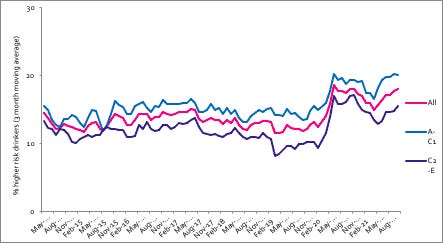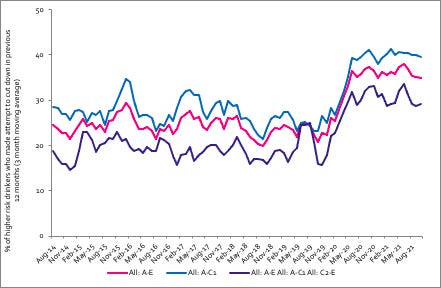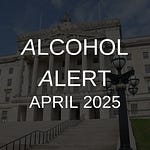Hello and welcome to the Alcohol Alert, brought to you by The Institute of Alcohol Studies.
In this edition:
‘No Escape: How Alcohol Advertising Preys on Children and Vulnerable People’
‘Sobriety ankle tags’ rolled out after successful pilot
Cross party group of MPs demands better approach to reduce alcohol harm
Disagreement over alcohol duty reform
Scottish LibDems and 28 NGOs call for minimum unit price to increase
Diageo’s Christmas ‘responsibility’ campaign normalises excessive drinking
No major economy covers the cost of harm from alcohol, tobacco and sugar
Alcohol-fuelled incidents at Wales rugby matches spark criticism
We hope you enjoy our roundup of stories below: please feel free to share. Thank you.
Event: New IAS report on restricting underage alcohol purchases
Join us on Wednesday 8 December for the launch of our new report on ‘Preventing underage alcohol purchasing online using payment card details’. Register here.
With a growth in online purchasing, particularly since the pandemic, online age verification for buying alcohol is increasingly important. Currently most systems are poor, such as relying on honesty policies or uploading documents.
In a new IAS-commissioned report, Jessica Muirhead looks at how 'Merchant Category Codes' could be used for online alcohol purchases. Every time a payment is made on a bank card, a code is sent with payment details to identify the type of transaction. This is already used to prevent under-18s from gambling and would better protect retailers from illegally selling alcohol to under-18s.
This month’s IAS blogs
Alcohol Toolkit Study: quarterly update
UCL’s quarterly alcohol data suggest that the number of increasing and higher risk drinkers has steadily increased since May 2021.
Prevalence of increasing and higher risk drinking (AUDIT)
Increasing and higher risk drinking defined as those scoring >7 AUDIT. A-C1: Professional to clerical occupation C2-E: Manual occupation
Currently trying to restrict consumption
A-C1: Professional to clerical occupation C2-E: Manual occupation; Question: Are you currently trying to restrict your alcohol consumption e.g. by drinking less, choosing lower strength alcohol or using smaller glasses? Are you currently trying to restrict your alcohol consumption e.g. by drinking less, choosing lower strength alcohol or using smaller glasses?
All past-year attempts to cut down or stop
Question: How many attempts to restrict your alcohol consumption have you made in the last 12 months (e.g. by drinking less, choosing lower strength alcohol or using smaller glasses)? Please include all attempts you have made in the last 12 months, whether or not they were successful, AND any attempt that you are currently making.
‘No Escape: How Alcohol Advertising Preys on Children and Vulnerable People’
On 30 November the Alcohol Health Alliance launched a new report that looks at alcohol marketing in the UK and calls for the Government to introduce restrictions to such marketing in order to protect children and vulnerable people.
Discussing the prevalence and ubiquity of alcohol marketing, the report shows that advertising is across an enormous range of sectors, using a range of mediums: at sporting events, festivals, TV entertainment, theatres, across outdoor media. They rebut the industry assertion that marketing is simply about brand switching and doesn’t increase and encourage consumption. The AHA argues that:
“The alcohol industry logically requires the continual recruitment of new generations of drinkers. Indeed, many brands see marketing as a key way to recruit new consumers and some specifically target the youngest demographics of legal drinkers.”
The report focuses on the danger of marketing to children and those in recovery. The AHA writes that it normalises alcohol and “creates a culture where alcohol is seen as an essential part of everyday life”. Respondents to the report’s survey said this led to pressure on them to drink in order to fit into that perceived culture. As the report states, studies have shown that children who are exposed to alcohol advertising are more likely to start drinking earlier in life, and subsequently will consume more. They are also more likely to develop alcohol dependency later in life.
The AHA report asserts that the UK’s self- and co-regulatory approach to alcohol marketing fails to protect children from exposure to large amounts of marketing, with studies showing that children are aware of alcohol adverts and that they appeal to them too. Although there is less data on the effect of adverts to people in recovery, survey respondents discussed how marketing and imagery of alcoholic products is highly triggering and likely to increase relapse. They argued it should be treated like tobacco due to the harm it causes.
The Office for Health Improvement and Disparities agrees that the current system is flawed, stating:
“A consistent body of research demonstrates considerable violations of content guidelines within self-regulated alcohol marketing codes, suggesting that the self-regulatory systems that govern alcohol marketing practices are not meeting their intended goal of protecting vulnerable populations.”
What is the AHA calling for?
In order to catch-up with many other countries across the world who have implemented alcohol marketing restrictions – such as Ireland, Finland, France, and Russia – the AHA report was clear on its policy recommendations:
‘Sobriety ankle tags’ rolled out after successful pilot
Following a seemingly successful pilot for community sentences, ‘sobriety ankle tags’ have been rolled-out for ‘serious and prolific offenders’. Those who are known to reoffend after drinking alcohol will face a potential ban from drinking or limitation to the amount they can consume. The tags can detect alcohol in the wearer’s sweat and alert probation services if detected.
An estimated 12,000 people will wear the tags over the next three years and judges can either include a condition that requires up to a year of abstinence, or have the person’s alcohol monitored with a defined level allowed.
Previously the Government has said the tags would not be used on adults who are alcohol-dependent or suffering from certain medical conditions, and that they would not be intended as a treatment for alcoholism.
The formal name for the requirement is ‘Alcohol Abstinence Monitoring Requirement (AAMR)’, and will be rolled-out in Wales first, with England following suit in summer 2022. Those who are banned from drinking and contravene the order could be:
Fined
Have their order extended
Imprisoned
The Ministry of Justice says that the tags will help reduce the level of alcohol-related crime, with alcohol playing a part in 39% of all violent crime in the UK. They also state that such crime costs the UK economy around £21.5 billion every year.
Discussing the pilot projects that saw such tags fitted to people with community sentences, Justice Secretary Dominic Raab said:
“This innovative technology has been successful in policing community sentences with offenders complying over 97 percent of the time. Offenders now have a clear choice. If they don’t work with probation staff to curb their drinking and change their ways, they face being sent back to jail.”
What are the legal complications?
Dr Arianna Andreangeli, of Edinburgh Law School, has previously raised concerns about the potential legal issues surrounding the policy, stating “there is no doubt that it constitutes an intensive interference with the individual’s right to private life, as enshrined in the European Convention on Human Rights”. She questioned whether there are sufficiently strong safeguards to accompany the policy in protecting these rights.
A 2012 paper however, argued that “the law clearly permits the imposition of sobriety conditions, and there are no convincing grounds for objections based on human rights law”. The authors went further, stating that “in fact, given the prospective benefits to both offenders and the public, it would be extremely unethical not to implement the scheme”.
What are the health concerns?
When the pilot projects were launched, a number of NGOs highlighted that that the tags needed to be implemented within a holistic system of support and prevention.
Nuno Albuquerque, an Addictions Counsellor at the UK Addiction Treatment Group has previously said:
“What they're doing in effect is just slapping a sticking plaster over the top of a person's open wound. Tagging them simply stigmatises them for drinking alcohol and doesn't address the root cause of the problem.”
“Collaborative support between probation teams and treatment providers needs to be in place so that when the tag comes off, the person won't want to drink, rather than being forced not to drink.”
Dr Richard Piper, Chief Executive of Alcohol Change UK, echoed Nuno’s concern about the risk of stigma, saying that there is risk of reinforcing the stigma that people living with alcohol problems face, reducing the likelihood of them seeking support. He said:
“We must address problem drinking as a whole, including preventing it before it starts. We need a properly funded alcohol treatment system that is well-integrated with other forms of health and social care. We need to encourage those whose drinking is increasing to seek help before it becomes a serious issue, and make it easy for them to do so.”
This touches on an important aspect of the policy: that it is reactionary and may do little to reduce the number of people initially engaging in alcohol-fuelled crime. The Ministry of Justice is focusing on the 97% compliance rate as they have no data on whether the tags actually reduce crime, especially when the tags come off. Further, as Dr Piper points out, there is little evidence to suggest the scheme will reduce drinking in the long-term, after the tags have been removed.
Cross party group of MPs demands better approach to reduce alcohol harm
On 25 November the Commons debated alcohol harm, with a group of cross-party MPs calling on the Government to improve their response to a growing crisis.
The debate, jointly secured by Labour MP Dan Carden and Conservative MP Derek Thomas, highlighted the harm alcohol causes to individuals, society and the economy. There was consensus among the parliamentarians present that the Government is not doing enough and needs to launch an alcohol strategy to tackle the rise in deaths and liver disease.
Thomas said the strategy needs to be part of the Covid recovery plan and that minimum unit pricing needs to be introduced “without delay”, as it’s already been shown to work in Scotland.
Thomas said:
“Far from being an issue for individual responsibility, as it is often framed by the industry, there is a compelling case for Government intervention to end the cultural celebration and normalisation of alcohol in public, while vulnerable individuals suffer harm and stigma behind closed doors. Never before has action on alcohol been so urgently needed as it is now. We must do more; we must do better.”
Labour MP Liam Byrne spoke of his personal experiences as a child, with a father who struggled with alcohol problems:
“Trying to make yourself invisible to disappear from the shame of some terrible public incident; the chronic insecurity; the bouts of violence; the hospital visits; and the trouble with ambulances. There is the pervasive sense of guilt. Am I doing enough? Is my father okay? Is he eating? Is he starving? Or is he on a floor somewhere?”.

Shadow Public Health Minister, Alex Norris, highlighted the cuts to treatment services and that Labour wants labelling on products to be improved as “It is about informed choice; we know that that is what customers want too”.
Maggie Throup, Parliamentary Under-Secretary of State for Health and Social Care, said the Government have agreed to carry forward the recommendations of part two of Dame Carol Black’s independent review of drugs and will publish a drug strategy later this year which “will also benefit people seeking treatment for alcohol dependency”.
Disagreement over alcohol duty reform
Following the Government’s October Budget announcement that included proposed reforms to our outdated alcohol duty system, the House of Commons and Lords have discussed the potential impact of the changes. Industry figures too, have reflected on how the reforms will play out.
Conservative peer Lord Kamall, Parliamentary Under-Secretary of Health, responded to criticism from Labour’s Baroness Hayter, who said freezing duties will be bad for public health, by stating that public health advocates have been calling for this reform for years.
Lord Kamall argued that the change will encourage alcohol producers to develop and push lower strength products, and the public to consume these cheaper, lower strength products, which will reduce harm.
Baroness Finlay questioned what the Government’s contingency is if the reform doesn’t reduce harm. Kamall responded that a programme is underway to address alcohol harm, including setting up alcohol care teams in hospitals and supporting children of dependent parents.
In the Commons many agreed with the duty reform, with Conservative Dehenna Davison focusing on ciders, with: “My inner low-tax Tory let out a massive cheer when I learned that fruit ciders were going to see a reduction in duty as well”. The SNP’s Carol Monaghan asked Davison whether she recognises “that fruit ciders have been linked to alcoholism in children, and that it is not necessarily a good thing to cut the tax on them?”, to which Davison responded that cutting tax is generally a good thing, but has to be alongside a proper public health strategy.
Other Scottish MPs pointed out wider issues with the reform, with the SNP’s Peter Grant saying that successive British Governments have failed “to put the wellbeing of the people front and centre of their taxation and spending plans”, highlighting the wealth various Scottish distilleries bring to Westminster coffers but not to the local Scottish populations, many of whom live “on or below the breadline”.
Alcohol industry figures have also pointed out perceived flaws to the reforms, with the Wine & Spirit Trade Association’s Chief Executive, Miles Beale, stating:
“We are mystified by a proposal that embeds unfairness between products meaning that beer will be taxed between 8p and 19p per unit, wine increases to 26p per unit and spirits remain at 29p per unit.”
There is undoubtedly a level of unfairness between how much alcohol will be taxed between the ABV strength 3.5-8.4%, with cider paying under half that of beer, wine and spirits. No clear rationale was provided for why beer is charged double that of cider between these strengths.
The Grocer also argued that although much of the duty reform makes sense, the “glaring exception” was that of reducing draught duty only for containers 40 litres and above. They said this will punish small British brewers who tend to use 20-30 litre containers.
The Guardian agreed with this, saying small producers argue the plans “would stifle innovation and favour large corporations” - as it’s the big brands that cause harm, not small independent producers, even those making high-strength drinks.
In response to a Parliamentary Question, Exchequer Secretary Helen Whately said that “We will discuss the size of containers that will qualify for the relief with brewers as part of our consultation process.” Conservative MP Mike Wood was reported as being “confident” that this limit will be reduced to 20 litres.
Scottish LibDems and 28 NGOs call for minimum unit price to increase
In mid-November the leader of the Scottish Liberal Democrats, Alex Cole-Hamilton, called for minimum unit pricing (MUP) to be increased from 50-65p in Scotland.
Mr Cole-Hamilton said:
"Alcohol misuse can wreck lives. Even today we are seeing an average of 20 people per week die due to alcohol misuse. Experts have suggested that raising the minimum unit price to 65p in line with the original ambition of the policy would cut alcohol misuse and reduce the pressure on our health and justice systems.”
He added that once it is increased it should be linked to inflation and thus increased each year, in order to avoid a diminishing effect over the years.
SNP Public Health Minister, Maree Todd, confirmed that the Scottish Government has "begun to gather information in order to review the minimum unit pricing of alcohol".
This call was followed on the 19 November by a group of 28 health charities and medical experts, who urged the Scottish Government to increase MUP to 65p to help reduce harm.
Alcohol-related deaths in Scotland
The group included Alcohol Focus Scotland, with their Chief Executive Alison Douglas saying:
“We need to off-set both the effects of inflation and of the pandemic, and adjust the minimum unit price to a level that will save more lives and prevent a new generation from developing an unhealthy relationship with alcohol.”
Dr Alastair MacGilchrist, chairman of Scottish Health Action on Alcohol Problems, said that there is a “sweet spot” when setting MUP:
“If you set it too low it's not going to be effective, but if you set it too high it's going to have an unfair impact on moderate drinkers. We think that raising to at least 65p would be the correct level just now and would certainly save lives.”
A day before, on 18 November, Nicola Sturgeon responded to a question on raising MUP during First Minister’s Questions, saying that the evaluation was ongoing, and any changes needed to have a “robust evidence base”.
"Prior to the pandemic, we were seeing early encouraging signs of a reduction in alcohol sales and a reduction in alcohol specific deaths. The pandemic and the changed legal landscape post-Brexit are two significant events that are impacting on this work and must be factored into the analysis."
Diageo’s Christmas ‘responsibility’ campaign normalises excessive drinking
The alcohol giant is in full festive swing, recently launching both a bold marketing plan and a corporate social responsibility (CSR) campaign called ‘Know When to Stop’. Within its marketing plan, Diageo is looking to grow its market share by a huge 50% by 2030, using the following tactics:
Ironically perhaps, another target for 2030 is to reach 1 billion people worldwide with dedicated ‘responsibility’ messaging.
Their Christmas campaign ‘Know When to Stop’ involves a number of animations depicting “overindulging in common holiday pleasures, such as eating sweet treats, binge-watching television and films, and over-decorating your home”.
Each animation ends with the line “There’s a happy limit to everything. Drink Responsibly”. It could be argued that this comparison of excessive alcohol consumption and other ‘over-indulgences’ such as decorating one’s home aims to normalise drinking. In a 2019 BMJ blog, Professor Mark Petticrew and Dr May Schalkwyk argued that:
“Christmas is a favourable time for the alcohol industry owing to a rise in marketing and sales, and an increase in events during which alcohol is served and consumed. However, this period also poses a threat to the alcohol industry as the adverse social and short-term health impacts potentially become more visible, and this visibility risks elevating public and media awareness of alcohol harms. To deal with these public relations risks, the alcohol industry is well versed in employing corporate social responsibility initiatives”.
They pointed out that:
“These attempts by the alcohol industry at promoting safety during this time of increased risk from alcohol harms, may actually be something different: mixed messages that normalise or even promote drinking heavily while attempting to minimise the visibility of short term overt harms, thereby ensuring that the industry gets its gift this Christmas—increased profits partnered with an unharmed corporate image.”
No major economy covers the cost of harm from alcohol, tobacco and sugar
The Centre for Global Development, a US international development think tank, published a paper on 17 November that looked at taxes on alcohol, tobacco, and sugar, across 25 major economies, and whether they cover the cost of the harm they cause.
The authors write that carbon taxing has garnered a lot of interest recently, whereas corrective taxes on the mentioned three products are “comparatively overlooked”. They state that these taxes “fall far short of the huge negative externalities and self-imposed costs from alcohol, sugar and tobacco”.
Across the 25 countries, which account for three-quarters of global GDP, 60 million productive life years are lost every year due to the harm these three products cause, with an economic cost of $2.1 trillion each year, about 2% of GDP in advanced economies.
The following graph highlights how none of these countries get back the money lost in harm, with Bangladesh the closest to recouping the money, and Russia and Ukraine furthest away.
When looking at alcohol individually, Turkey is the only country that raises enough tax to cover finances lost due to alcohol harm.
The authors argue that such taxes “should be a routine part of the advice provided by international financial institutions to emerging markets and advanced economies with high rates of consumption” and that the IMF and World Bank are paying “growing but still limited attention to these kinds of taxes in operations in fiscal policy”.
IAS will shortly publish a blog by the authors on the subject.
Alcohol-fuelled incidents at Wales rugby matches spark criticism
BBC Wales published a story on 23 November highlighting a number of alcohol-related incidents at rugby matches in Wales during the Autumn internationals. These incidents included a child being vomited on, a boy being given £20 after having a beer spilled on him, and pitch invaders in two matches, one of which potentially prevented Wales from scoring a try.
The article quotes a liver specialist, Dr Dai Samuel, who said, “the halo of rugby has well and truly slipped this autumn”.
It goes on to quote IAS’ Dr Sadie Boniface, who said:
"The normalisation of heavy drinking in relation to sport is at odds with the health benefits of participating in sport. Alcohol marketing also means alcohol is virtually unavoidable in sport. For example, in the 2020 Six Nations, there were alcohol references several times a minute. There is a link between alcohol sponsorship in sports and alcohol consumption, including among children and young people.”
Dr Boniface argued that IAS would like to see similar legislation in the UK to Ireland, which has banned alcohol advertising during sporting events.
Interestingly, the framing of the new law by some seems to already be comparing it to the French Loi Évin rules, which are often circumvented by using ‘alibi marketing’: using marketing that is synonymous with a brand without directly mentioning it.
The Welsh Rugby Union said:
"It is policy for our staff to intervene if people are visibly intoxicated - this happens in three main areas: The turnstiles where people can be denied entry, at the point of sale if they try and buy alcohol, and in the stadium bowl."
The story also quoted a previous IAS blog by Habib Kadiri, who asked "why we haven't extended the alcohol ban to all sporting grounds? Perhaps it is because no other sports have attained football's notoriety. But why risk it?".
In a recent Parliamentary Question, Baroness Hayter asked what plans the Government has “to protect children and vulnerable populations from exposure to alcohol marketing”, following the IAS, SHAAP and AAI Six Nations marketing report.
In response, Lord Parkinson said that the “UK advertising industry has some of the strictest alcohol regulations in the world [and that] if new evidence emerges that clearly highlights major problems with the existing Codes, then the Advertising Standards Authority has a duty to revisit the Codes and take appropriate action.”
The UK Alcohol Alert (incorporating Alliance News) is designed and produced by The Institute of Alcohol Studies. Please click the image below to visit our website and find out more about us and what we do, or the ‘Contact us’ button. Thank you.

























